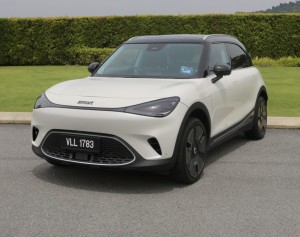File pic of Suzuki. He died of cancer on Dec 25. — AFP
TOKYO: Osamu Suzuki, who ran Suzuki Motor Corp., known for its minicars and motorcycles, across several decades and drove the company’s global expansion, has died. He was 94.Suzuki died of lymphoma on Dec 25, the company said in a statement.
Born Osamu Matsuda, Suzuki married into the family that gave the Hamamatsu, Japan-based automaker its name. During his long tenure, he formed partnerships with General Motors Co. and Volkswagen AG to sell vehicles in North America and Europe and leveraged Suzuki Motor’s expertise in small cars to build a dominant market share in India.
"If I were to listen to everybody, it would make things too slow,” Suzuki said of his leadership philosophy in "I’m a Small-Business Boss,” a Japanese-language memoir published in 2009. "Never stop, or else you lose.”
Suzuki’s more than 28 years as president across two terms made him the longest-serving head of a global automaker.
He passed the presidency to his son in June 2015 and assumed a role as chairman and chief executive officer, a dual title he held onto for a year before stepping down as CEO in the wake of a fuel-economy misstatement.
The company admitted to using unapproved methods to test the fuel-mileage of its vehicles in Japan, spurring a sharp selloff in the company’s stock and a wave of management departures.
The automaker sold about 3.2 million vehicles worldwide in the fiscal year that ended in March 2024, trailing Japan’s dominant carmaker and world No. 1 Toyota Motor Corp., according to data compiled by Bloomberg.

Suzuki with the Swift in November 2004. - AFP
More than half of those vehicles were sold in India, where the company’s Indian unit, Maruti Suzuki, holds the lion’s share.
A former bank employee, Osamu Suzuki got his start in the automotive business thanks to his arranged marriage to Shoko Suzuki, a granddaughter of Michio Suzuki, who founded Suzuki Motor’s predecessor, a loom manufacturer, in 1909. Osamu Suzuki took his wife’s surname, as is the Japanese custom when there are no male heirs to a family business.
He joined the company in 1958, three years after the debut of its first motorcycle, the ColledaCOX 125cc 4-cycle, and the Suzulight 360cc 2-cycle car, which helped usher in Japan’s minivehicle age.
He served in several management roles before becoming president in 1978. The next year he made his first mark by introducing the Alto minicar in Japan. A big hit, the model was credited with resurrecting the domestic market for minicars.
Betting that the company could establish a foothold in small markets neglected by larger rivals, he led Suzuki Motor’s overseas expansion by building production bases from Pakistan to Hungary.
His greatest achievement was often considered to be his expansion into India.
Maruti, now a unit of Suzuki Motor, quickly became the biggest carmaker in India, though its market share has been eroded by Hyundai Motor Co. and Tata Motors Ltd.
Suzuki today is also one of the top global manufacturers of motorcycles, selling around 1.9 million units in the 12 months ended March 31. The brand has become well-known for winning world titles.
Osamu Suzuki was born Jan 30, 1930, in Gero, a city in central Japan’s Gifu prefecture. He was the fourth son in a farming family.
Aspiring to be a politician, he worked part-time as a junior high-school teacher and night guard while completing his degree in law at Chuo University in Tokyo, according to a March 2009 article in Nikkei BP magazine.
After graduating from Chuo in 1953, he went to work at a bank until his marriage brought him into the family business.
He and his wife had three children.












